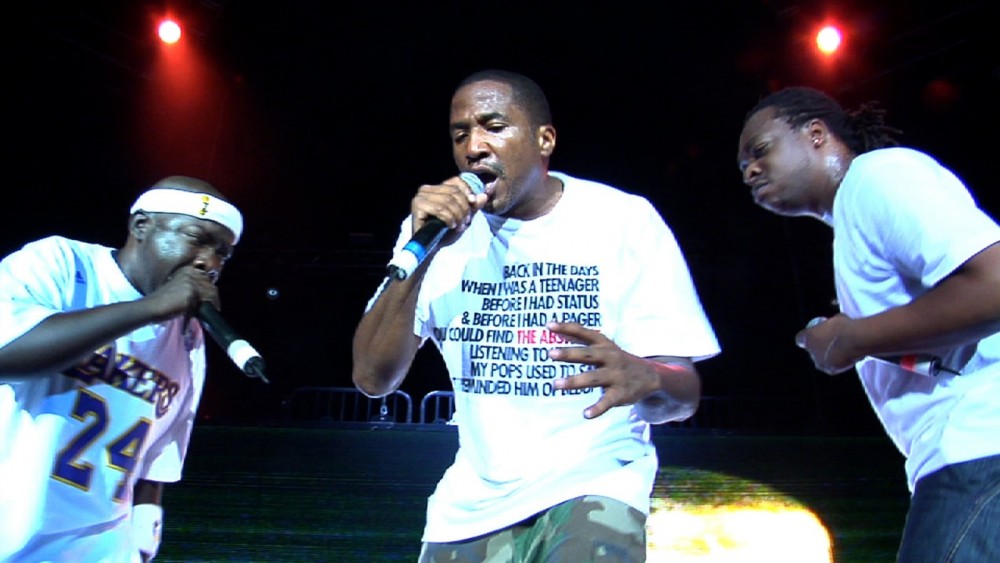âÄúBeats, Rhymes & Life: The Travels of A Tribe Called QuestâÄù
Directed by: Michael Rapaport
Starring: Q-Tip, Phife Dawg, Ali Shaheed Muhammad and Jarobi White
Rated: R
Showing at: Uptown Theatre
One must be careful when making a music documentary. Especially when said doc covers a major group that has experienced inner turmoil ÂâÄî something âÄúBeats, Rhymes & Life,âÄù Michael RapaportâÄôs directorial debut on hip-hop pioneers A Tribe Called Quest, packs aplenty. There is a thin line between an in-depth summary of a musical odyssey and VH1âÄôs âÄúBehind the Music.âÄù
Rapaport, who you might recognize as the curly-headed gooninâÄô90s films like âÄúTrue Romance,âÄù âÄúHigher LearningâÄù and âÄúDeep Blue Sea,âÄù mostly accomplishes the former in âÄúBeats.âÄù The 98-minute documentary covers the storied quest of the Tribe, from their humble beginnings in the late âÄô80s to their tumultuous 2008 reunion tour. Featuring interviews from the likes of the Beastie Boys, De La Soul, Ghostface Killah and Common, the film highlights both the colossal impact of the hip-hop foursome-turned-trio and their eventual implosion.
Rapaport weaves artful cinematography through its documentary standards (e.g., revisiting high schools, thoughtful interviews at neighborhood landmarks). Some of the more visually striking moments play out in animated scenesthat mimic the trademark red-and-green brush strokes seen on the TribeâÄôs âÄô91 opus âÄúThe Low End Theory.âÄù
Through exhaustive interviews and winding trips down memory lane, the film naturally shows that: a) Q-Tip is the heart and soul behind the group but is a self-centered megalomaniac and b) Phife Dawg is the TribeâÄôs unsung hero but he can be a jealous baby. Therein lies the feud between the two emcees, who were best friends since âÄúback in the days on the boulevard of Linden.âÄù Phife uses RapaportâÄôs camera as a means of venting about TipâÄôs decision to go solo and make it all about him, while Tip is more careful âÄî fully aware that what he says can and will be used against him. Between them stands DJ Ali Shaheed Mohammad, who assumes the role of calm mediator.
The most brutal scene features an all-access peek at Phife insulting Tip mere moments before gracing the stage in their âÄô08 reunion tour. Tempers flare but the curtain rises, and the Tribe must blanket the turmoil with smiles and hand jives.
Such scenes also ruffled some feathers within the group. Feeling betrayed by his portrayal, Q-Tip has refused to support the film, opting out of all publicity efforts. Mohammad, Phife and Jarobi White (who left the group before âÄúThe Low End TheoryâÄù), however, have supported the director, who calls the Tribe âÄúhis favorite group.âÄù
With the film focusing more on drama than music, a âÄúSocial NetworkâÄù-esque plotline emerges, which could explain Q-TipâÄôs reservations. You have the ambitious and talented lifeblood of the project that drives to personal glory without glancing in the rearview mirror. Then thereâÄôs the likeable and almost as talented second fiddle, who feels slighted when the ship he helped build leaves him behind.
But if you are making an honest documentary about such a turbulent ship, it might be considered a failure if you donâÄôt piss somebody off. Sure there are times when the feud between Phife and Q-Tip sounds like Nikki Sixx fighting with Tommy Lee in an histrionic episode of âÄúBehind the Music,âÄù but when it all boils down to it, this is a doc that tries to be as freewheeling and creative as its legendary subject matter. And if it accomplishes nothing more than bringing Q the Abstract and Phife the Five Footer back to the forefront of our attention, Rapaport succeeds. And Q-Tip, ironically enough, is simply âÄúbugginâÄô out.âÄù
3 out of 4 stars








